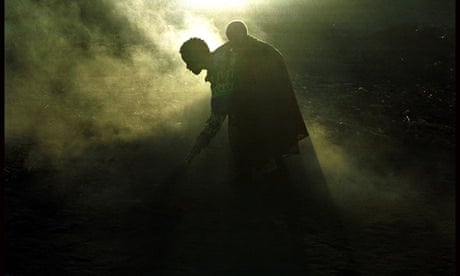Memory Banda beat the odds. In Malawi, five out of every 10 girls marry before the age of 18. Her sister married aged 11, but Banda vowed to finish school. When girls in her village were subjected to sexual initiation, Banda organised literacy classes to teach them how to read.
Growing up in rural Malawi as the eldest of six siblings, Banda remembers hearing about kusasa fumbi, the traditional practice of sexual cleansing common in southern Malawi. This initiation practice forces young girls to have sex with an older man to cleanse their “childhood dust” and prepare them for adulthood. Known as the “hyena”, this man travels between villages, paid by the community to have sex with girls as young as nine, often exposing them to unwanted pregnancy and HIV infection.
This socially sanctioned form of gender-based violence violates girls’ basic human rights, and has devastating repercussions. “Malawi has one of the highest rates of maternal mortality in the world and 10% of the population is HIV-positive,” said Dr Howard Kasiya, health expert and director of the Adolescent Girls’ Advocacy Network of Malawi. “Being forced to undergo kusasa fumbi is often a death sentence for girls.”
Many of the girls who undergo kusasa fumbi are subsequently forced to marry and stop their education. A Human Rights Watch report found that, between 2010 and 2013, 44,000 girls attending primary school in Malawi dropped out due to marriage or pregnancy.
In 2011, Memory Banda met Faith Phiri, the co-founder of Malawi’s Girls Empowerment Network (Genet). Phiri invited Banda to join Genet’s stop child marriage campaign. As part of the campaign, Genet conducted research with 40 girls from local villages to learn about the prevalence of kusasa fumbi and forced marriage. The organisation designed a storytelling programme called “The river of life” in which each girl shared her personal story using art, poetry and creative writing to discuss the obstacles she faced, and her hopes for the future. Banda and the girls shared how harmful traditional practices created pressure to drop out of school and get pregnant. Banda said participating in Genet’s river of life was transformational: “Until then, I always thought I was the only one who suffered. But sharing my story gave me strength to know that I wasn’t alone.” From the girls’ stories and artwork Genet published I Will Marry When I Want.
“Girls’ stories and experiences are powerful. By raising their voices, girls can create change,” said Phiri. “When girls speak out, our leaders must listen.” Genet trained the girls in leadership, advocacy and public speaking so they could present their publication to village chiefs and Members of Parliament.
The girls’ advocacy led to an alliance with a female head chief from the community of Chitera in the Chiradzulu district of southern Malawi. Genet and the girls worked with her and other village chiefs to develop bylaws that penalise men who engage in kusasa fumbi and child marriage. This girl-led advocacy campaign led to traditional authorities increasing the legal age of marriage to age 21, penalising men who marry underage girls with significant fines paid in goats, chickens and land. Parents who allow their underage daughters to marry are required to perform three months of janitorial service in the local school.
Genet is working with the Chiradzulu District Council and the Social Welfare Office to monitor implementation. “Over 60 chiefs have ratified these bylaws, protecting thousands of girls from child marriage,” said Phiri. An external evaluation commissioned by the UN Foundation showed that community leaders now view kusasa fumbi and child marriage as shameful, and have created community-led Girls’ Education Funds to help survivors of child marriage return to school.
Leveraging growing momentum to end early and forced marriage in Malawi, Human Rights Watch is calling upon the government to set a minimum legal age for marriage. Malawi’s Adolescent Girls’ Advocacy Network is pushing for a national law to raise the legal age of marriage from 16 to 18, but struggles with limited political commitment. “Our leaders see the evils of child marriage. They talk of change but they are not yet taking action,” said Kasiya. “But through sustained girl-centred advocacy, we will increase the marriage age once and for all.”
Malawian communities are adopting innovative strategies to wipe out kusasa fumbi and child marriage. Genet is working with village leaders to make the content of girls’ initiation camps more girl-friendly, while upholding positive cultural traditions. “Where 10-year-old girls used to learn how to please their husbands in bed, they now learn life skills – leadership, self-esteem, and how to become strong women in the community,” said Phiri.
Memory Banda is now attending college in Malawi, and mobilises girls to raise their voices and beat the odds through her advocacy with Genet and Let Girls Lead. “You will never know you are a leader until you stand up,” said Banda, who is speaking at the United Nations General Assembly on 22 September. “Help a girl child develop. Let’s influence change.”
Denise Dunning is the executive director and founder of Let Girls Lead and Joyce Mkandawire is co-founder of Genet. Follow @DeniseRDunning and @genetmalawi on Twitter.
Read more stories like this:
FGM and child marriage: grandmothers are part of the problem and the solution
Aids, pregnancy and the church: young Hondurans take a stand
Child marriage in Nepal: what do you do when it’s by choice?
Advertisement feature: World’s first insta-doc #Freedomis focuses on ending FGM and child, early and forced marriage
Join our community of development professionals and humanitarians. Follow @GuardianGDP on Twitter.

Comments (…)
Sign in or create your Guardian account to join the discussion